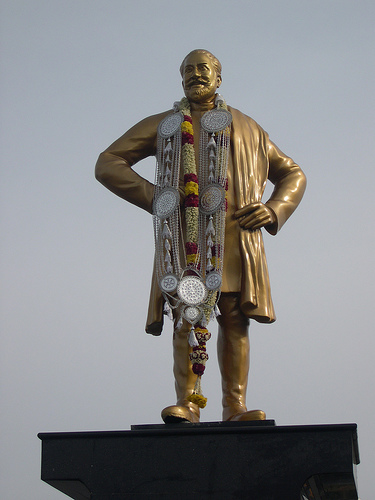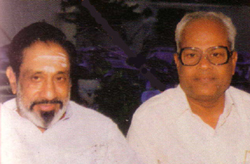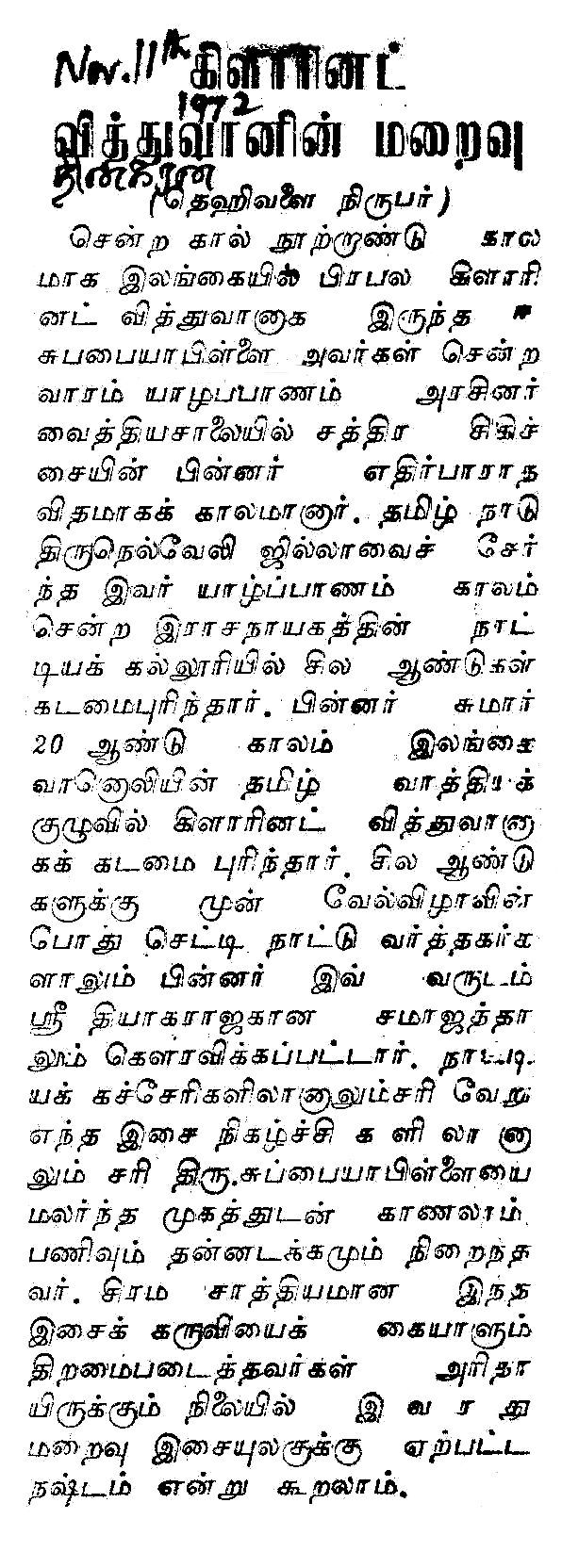One Hundred Tamils of the 20th Century Sivaji Ganesan - Nadigar Thilakam
1 October 1927 - 21 July 2001

Sivaji Statute in Marina, Chennai
unveiled on 21 July 2006
 நான் கவிஞனும் இல்லை... நான் கவிஞனும் இல்லை...
A Lesson in Gratitude from the Movie Maestro Sivaji Ganesan
by Sachi Sri Kantha, 20 December 2005... It is always enchanting and heart-warming to read and listen to real life events, which are educational at any time to individuals of all age ranges. In this spirit, towards the end of the year, I provide the following two anecdotes from the life of Tamil movie legend, Sivaji Ganesan (1928-2001). In these two anecdotes, Sivaji Ganesan had taught to many, what is gratitude and why it deserves recognition and popularisation. The first anecdote was from a memoir book about the Tamil movie world which I read recently, It was authored by distinguished Tamil movie script writer Aroordhas, who had known personally and professionally Sivaji Ganesan for decades. The second anecdote was oral history I heard in Colombo three decades ago from one of my music mentors,violinist Vannai G.Shanmuganantham. Both anecdotes have a few inter-linking threads. The oral story I heard around 1975 neatly gelled with the written story which I read recently. Sivaji Ganesan and his tutor K.D.Santhanam [written story] 
Sivaji with Aroordhas |
Renowned script writer and director Aroordhas (born 1931) has a five decade track record in Tamil movie history. His stage name Aroordhas is a clipped version of his full village cum personal name of Tiruvaroor Aarokiyadhas. His memoir book, Naan Muham Paartha Cinema Kannadigal [The Cinema Mirrors I have Looked At; Kalaignan Publishers, Chennai, 2002, 224 pages] carries a delightful collection of anecdotes on the personalities who moved the movie world of South India. I was rather touched by a reminiscence provided by Aroordhas on Sivaji Ganesan in section 18 of the book (pages 109-113). I provide my English translation of this entire section below. “The Madurai Mangala Bala Gaana Sabha was a drama troupe managed by Ethaartham Ponnusami Pillai of Thiruvathavoor, Madurai. This troupe stationed themselves in Tiruchi and conducted dramas at the Thevar Hall. From Sangili Aanda Puram, a boy aged 6 or 7 had joined this drama troupe with his friend, a neighbor’s son. In this drama troupe, there was a Tamil tutor (Vaathiaar) who taught drama and Tamil to the young charges. He was short in stature and was extremely strict. With or without sense, this tutor punished his young charges by cane beating, even for smallest errors. Because of this, the young boys had their bowel leaks, when they saw or even dreamt about this extreme disciplinarian cum tutor. In their dreams, he appeared like a charging lion. But that Tamil tutor had a great gift. He could compose beautiful, rhyming Tamil songs based on poetic grammar. One day, at the stage, that boy from Sangili Aanda Puram was acting in the role of a young widow. And by carelessness on that day, he was wearing a blouse. This had been noticed by that disciplinatrian tutor. In that era, wearing blouse by widows was rather inappropriate according to societal norms. At the end of the scene, that Tamil tutor harshly gave a cane beating to that young boy; ‘Can’t you be so careless and unrealistic in your profession?’ was the complaint against that young boy. Guess who was that young charge, who received such a beating? Maestro Sivaji Ganesan. Who was that cane-loving tutor? My most respectful and admired elder and great poet, K.D.Santhanam (S). 43 years ago, during the shooting of the movie ‘Pasa Malar’, I met elder K.D.S. at the old Neptune Studio and paid my respects. In that movie, when Sivaji Ganesan (the hero) becomes rich, he is met by a character named ‘Rajaratnam’. KD.Santhanam played that character. That young charge V.C.Ganesan never forgot about, in his illustrious career, from whom he received the cane-beating and from whose beating he learnt the alphabets of acting and Tamil diction. It was he, after establishing his fame in the movie world, who recommended his harsh disciplinarian tutor for that particular character in his great movie. During the shooting days, Sivaji would be seated outdoors near the shooting floor with crossed legs and be in conversation with me, while having a cigarette in his lips. Then, elder K.D.Santhanam would occasionally pass us from the make-up room towards the shooting floor. At the instant when Sivaji sees his old tutor, he would dutifully stand up in respect, and hide the cigarette behind his back. Though noticing that homage silently, the old tutor K.D.S. pretend ignoring us and with bowed head pass us quietly. It would touch my heart, when watching that simple, elegant and meaningful respect Sivaji paid for his old tutor. What a class! What a grateful protégé! I mention this anecdote because the younger generation should be informed of this humility and gratitude shown by maestro Sivaji. Once, after K.D.S. had passed us and went beyond the listening distance, Sivaji sat back and told me: ‘Aarooran! On this Santhanam tutor (Santhana Vaathi) who passed us. The amount of beating I got from him isn’t a few. During dance training (when a step is missed for a beat), during dialogue training (when a word is missed), he beat us severely! Oh Mother – He’d chase and chase us and beat us! Even when he went to the toilet, he carried his cane. Now he is passing us like a young girl with head turned towards the floor. Even when I thought about him in those days, I’d shiver.’ I asked him jokingly: ‘Then, why did you recommend him for this role?’ [Sivaji said] ‘You don’t know. Because of those beatings I received from his hand, I’m now sitting comfortably like this as Sivaji Ganesan. When I joined the drama troupe, I was a zero. From him only, I learnt how to speak dialogue and how to act. Do you know, what a classy Tamil poet he is? What a poetic touch he carried in his hands? The songs he wrote for the Ambikapathi [1957] movie I acted: Ah! What sweet Tamil, and what lilting rhythm! I tolerated all those beatings because of his blessed Tamil knowledge. Otherwise, I’d have quit the troupe and ran back to my home during any one of those nights.’ Later, when elder K.D.S. was alone at the shooting floor, I approached him and politely mused; “Elder Sir, I’ve heard that you gave severe beating to Sivaji Annan in his young days.’ [K.D.S.] ‘Oh! He has told you about that. Oh! That was in those days. Now I’m becoming senile. I cannot remember your script now. Not only that, when Thambi Ganesan stand in front of me, shouldn’t I look at his face and deliver my dialogue? When I look at him now, I’m getting nervous! Because of that, can you prepare me for my dialogue by repeating your script not once but four times? It may be a bother. Kindly oblige.’ How Time did change? The same great tutor who taught dialogue to Sivaji Ganesan in his young days, with disciplinary cane at his hand, now he feels nervous to stand in front of his illustrious protégé, and ask me to prepare him well for a scene in which he faces his protégé.”
When I read these pages from Aroordhas’s book, I was touched by three inter-twined elements; (1) a thankful protégé’s devotion to an extremely strict, but sincere, mentor, (2) repayment of intellectual debt by an esteemed protégé, and (3) the mentor’s heart-felt pride on the grade made by his protégé. What Sivaji Ganesan said of the touching poetic feel of his mentor K.D.Santhanam was no exaggeration. The 16 lines of that one sweet melody in the Ambikapathi [a historical love yarn set in the 12th century Chola Kingdom, along the lines of the more popular Romeo-Juliet story] movie, beginning with the lines ‘Kannile Iruppathenna Kanni Ila Maane’ and sung by P.Bhanumathi as well as T.M.Soundararajan were from the fertile mind of K.D.Santhanam. Sivaji Ganesan and his boyhood pal E.Subbiah Pillai [oral story] Around the time [in 1961 or 1962] when his signature movie Pasa Malar was released, Sivaji Ganesan visited Colombo. I heard the following story from my mentor Vannai G.Shanmuganantham, around 1975, who was an eye-witness. 
E.Subbiah Pillai |
At a cultural function held at the Saraswathie Hall, Bambalapitiya, Sivaji Ganesan was the guest of honor. With his roving eye, he had a glance at the orchestra performing at the side of the stage. During intermission, he rushed to the orchestra team and stood in front of the clarinetist E.Subbiah Pillai, who was calm and composed. With stretched hands, Sivaji greeted him, “Neenga Subbiah Annan ille” [Aren’t you Subbiah elder?]. The clarinetist softly responded in the affirmative. Then, Sivaji immediately hugged his long-lost boyhood pal, and was overcome with emotion. The words fumbled from his mouth. “Anne! Suhama irukeengala? Eppavo, Ceylonukku oodi poonatha sonnanga. Athukappuram, oru sethiyum kiddaikale.” [Brother, are you keeping fine? Those days, I heard that you have run to Ceylon. After that, I didn’t hear any news about you.] Then only it became known to the fellow members of that orchestra team that Sivaji Ganesan [a junior] and Subbiah Pillai [a senior] were boyhood pals in a boys drama troupe, and one day [partly because of the disciplinary tactics of their tutors and partly because of the lure provided by a sea-crossing trip to Ceylon], Subbiah Pillai had moved to Ceylon without announcing his decision to his then clique. Thus, the pals became separated. In the intervening 25 years or so, while Sivaji Ganesan became a famous movie star in Chennai, Subbiah Pillai established himself as a clarinetist in the Radio Ceylon artiste. Subbiah Pillai, as a senior to Sivaji Ganesan, might have taught a few ‘steps’ in the art world then, to the talented rookie. Sivaji never forgot the face of his senior. I personally knew Subbiah Pillai ‘Master’ in the late 1960s and early 1970s. In fact, for my flute debut performance [Arangetram] held on December 3, 1971, at the Bambalapitiya Sammangodu Vinayagar Temple, my mentor T.P.Jesudas honored him by requesting him to ‘keep the Talam [rhythm keeper]’ in front of me. Then, after I entered the university, due to demands on time, I lost much contact with those older generation of musicians. One day [before I heard this Sivaji Ganesan anecdote from violinist Shanmuganantham Master] I received the news with shock that Subbiah Pillai ‘Master’ had died in Jaffna hospital, following a medical misadventure after an operation. Even now, I get a lump in my throat when I think about the calm and composed Subbiah Pillai Master – a senior to Sivaji Ganesean of old drama troupe days - who was the only clarinetist I knew in Colombo in those days. ...from Sri Lanka Tamil Daily 'Thinakaran',
11 November 1972 - on Death of Subbiah Pillai 
|
|